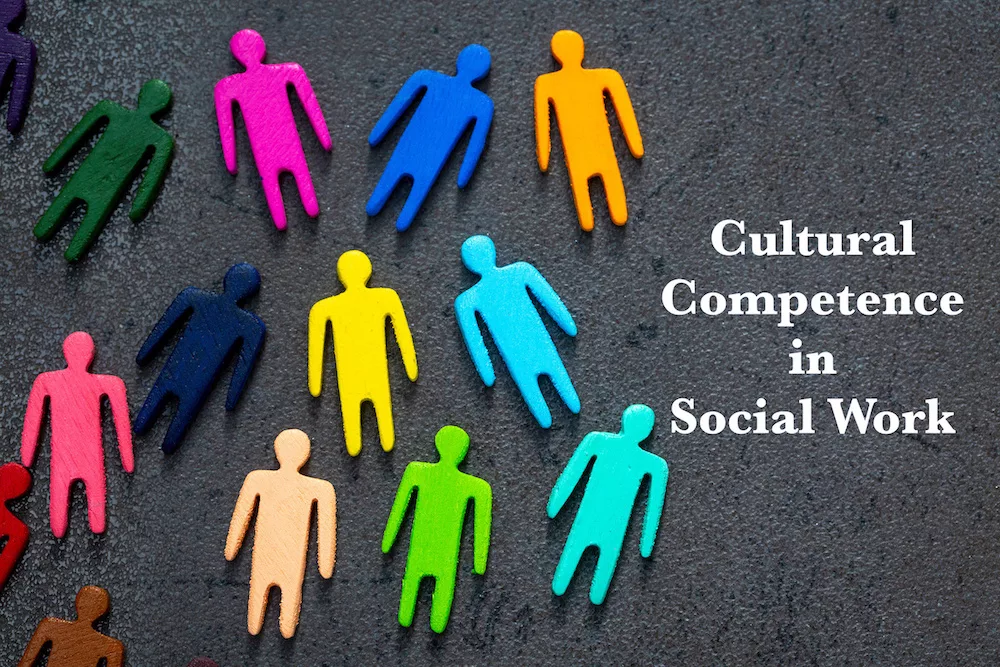

In the field of social work, cultural competence has become an indispensable skillset for professionals seeking to serve diverse populations effectively. According to the predictions of the U.S. Census, ethnic and racial minority groups are projected to constitute the majority in the United States by 2045.
This demographic shift underscores the urgent need for cultural competence social work in order to provide equitable and impactful services to diverse populations.
Within this article, we will explore various dimensions of cultural competence in social work, the NASW cultural competence guide, and the importance of cultural competence in social work.

Social Worker Cultural Competence
Are you prepared to embark on a transformative journey of cultural competence social work and revolutionize the way you approach your work?
Read on to find out all you need to know!

 Social Work Case Management Toolkit Software for Social Workers" width="1000" height="250" />
Social Work Case Management Toolkit Software for Social Workers" width="1000" height="250" />
Would you like to share feedback on this cultural competence in social work guide? If so, contact the Social Work Portal Team.
Table of Contents: Guide to Cultural Competence in Social Work
Keep on scrolling down this page to read each section or click any link below to go directly to that section.

Cultural Competence Definition in Social Work
If you’re new to cultural competence social work, you may first want to know what it is. To get that out of the way, we’ll start with the cultural competence definition social work outlines.
To put it simply, cultural competence in social work refers to the ability of practitioners to effectively understand, respect, and engage with individuals, families, and communities from diverse cultural backgrounds.
Social worker cultural competence involves acquiring knowledge, skills, and attitudes that enable social workers to navigate cultural differences, dismantle systemic barriers, and provide inclusive and equitable services.
Additionally, cultural competence in social work emphasizes self-awareness, cultural humility, and ongoing learning to ensure culturally sensitive and responsive practice that meets the unique needs and preferences of diverse populations.
If you’re wondering what the cultural humility definition social work is and how it ties in with cultural competence social work, we’ll take a look at that next.


What is Cultural Humility?
Cultural humility definition social work refers to an approach that values self-reflection, openness, and a continuous learning process when working with individuals and communities from diverse cultural backgrounds.
It involves recognizing the limitations of one’s own cultural perspective, challenging personal biases, and actively seeking to understand and appreciate the cultural experiences of others.
Unlike cultural competence, which suggests attaining a level of expertise or mastery in different cultures, the cultural humility definition social work emphasizes the importance of recognizing that individuals and communities are the experts of their own cultures and experiences.
It requires social workers to approach their work with humility, respect, and a willingness to learn from those they serve.


Do you have additional feedback on cultural competence definition social work or the cultural humility definition social work? Click here to contact the Social Work Portal Team.
What is NASW Cultural Competence Guide?
Officially known as the NASW Standards and Indicators for Cultural Competence in Social Work Practice is a document developed by the National Association of Social Workers (NASW) that provides guidance and a framework for social worker cultural competence.
Cultural competence NASW resource outlines the knowledge, skills, and values necessary for social workers to effectively engage with individuals, families, and communities from diverse cultural backgrounds.

Cross Cultural Social Work
If you’re looking for software that helps you keep track of all your cases and clients, subscribe to our All-in-One Case Management Hub Platform and improve the way you work.
Next, we’ll hone into 10 NASW standards for cultural competence.


NASW Standards for Cultural Competence
The NASW standards for cultural competence in social work practice serve as a guide for social workers to:
By adhering to these cultural competence NASW standards, social workers can work towards eliminating cultural biases, promoting equitable care, and building stronger relationships with the individuals and communities they serve.
Let’s take a look at NASW cultural competence standards together!
Standard 1 of Cultural Competence NASW – Ethics and Values
Social workers must adhere to the NASW Code of Ethics, integrating cultural competence in social work by embracing self-awareness, cultural humility, and recognizing culture’s significance in effective practice.
If you’re looking for a way to make your social work practice even more effective, sign up for SWP’s All-in-One Client and Case Management Software today and see how our tool can help you with intakes, assessments, case notes, correspondence, and so much more…
Standard 2 of NASW Cultural Competence – Self-Awareness
Social workers must appreciate their own cultural identities and acknowledge privilege and power dynamics, demonstrating cultural humility and cultural sensitivity in social work to power dynamics in all aspects of their work.
Standard 3 of Cultural Competence NASW – Cross-Cultural Knowledge
Social workers should possess and continuously develop comprehensive knowledge of various cultural groups, including their:
Standard 4 of NASW Cultural Competence – Cross-Cultural Skills
Social workers should utilize a range of skills and techniques at micro, mezzo, and macro levels, showcasing an understanding of and respect for culture in practice, policy, and research.
Standard 5 of Cultural Competence NASW – Service Delivery
Social workers should be well-informed about and proficient in using services, resources, and institutions that cater to multicultural communities, making culturally appropriate referrals, and addressing service gaps for specific cultural groups.


Standard 6 of NASW Cultural Competence – Empowerment and Advocacy
Social workers must be aware of the impact of social systems, policies, practices, and programs on multicultural populations, advocating for and with clients whenever appropriate, and participating in the development of empowering policies and practices.
Standard 7 of Cultural Competence NASW – Diverse Workforce
Social workers should support efforts to ensure diversity within the social work profession, advocating for recruitment, admissions, hiring, and retention initiatives in programs and organizations.

Cultural Diversity in Social Work Practice
Standard 8 of NASW Cultural Competence – Professional Education
Social workers should advocate for and participate in professional education and training programs that promote culturally competent social work practice, considering it a lifelong learning focus.
Standard 9 of Cultural Competence NASW – Language and Communication
Social workers must provide and advocate for effective communication with clients from diverse cultural groups, including those with limited English proficiency, low literacy skills, visual or hearing impairments, or disabilities.
Standard 10 of NASW Cultural Competence – Leadership to Advance Cultural Competence
Social workers should demonstrate leadership skills to effectively work with multicultural groups, both within organizations and in communities.
They have a responsibility to advance culturally competent social work practice, challenge oppression, and foster diverse and inclusive institutions and communities.
SWP’s Client & Case Management Software reduces paperwork and helps you streamline your workflow so you can spend more time helping clients.
Join Case Management Hub platform now and streamline your workflow and free-up valuable time for your clients.
With all 10 NASW standards for cultural competence in social work practice covered, we’ll give you some examples of cultural competence in social work so you can get a good idea of how this translates into practice.

 Social Work Case Management Toolkit Software for Social Workers" width="1000" height="250" />
Social Work Case Management Toolkit Software for Social Workers" width="1000" height="250" />
Do you have any questions about cultural diversity in social work practice? Do you have feedback on cultural sensitivity in social work in general? If so, contact the Social Work Portal Team.
Examples of Cultural Competence in Social Work | Social Work and Cultural Competence
Next, we will explore three clear examples of cultural competence in social work.
These examples of cultural competence in social work highlight how social workers can demonstrate respect for cultural beliefs and practices, engage in collaborative decision-making, and conduct culturally-informed assessments to provide effective and culturally sensitive support.
By incorporating NASW standards for cultural competence in social work practice and these examples, social workers can foster meaningful connections and promote positive outcomes for the diverse populations they serve.
Examples of Cultural Competence Social Work
The social worker, demonstrating cultural competence and cultural awareness in social work, takes the time to understand the client’s cultural background, including their traditions, beliefs, and values.
They recognize the influence of the client’s cultural experiences on their mental health and tailor the therapy approach accordingly.
The social worker incorporates culturally sensitive techniques, such as storytelling or incorporating cultural rituals, to foster a therapeutic connection and promote healing.
Need help to keep track of it all?
SWP’s All-in-One Client and Case Management Platform is a perfect solution for social workers that comes equipped with 40+ assessments and intakes, case notes, letter templates, and so much more.
Get started with Case Management Hub today and start maximizing efficiency, enhance collaboration, and elevate client outcomes.

Social Worker Cultural Competence
The family comes from a different cultural background, and the social worker understands the importance of cultural competency and cultural awareness in social work in engaging with them effectively.
They actively seek to learn about the family’s cultural practices, norms, and parenting styles, allowing them to understand the family’s strengths and challenges within their cultural context.
The social worker collaborates with the family, respecting their cultural values, and incorporates culturally appropriate interventions to promote positive parenting and child well-being.
These examples illustrate how cultural competence social work involves:
By embracing cultural competence, social workers can build meaningful connections and provide cross cultural social work effective support to individuals, families, and communities.

Do you have any questions about examples of cultural competence and cultural awareness in social work described above? Click here to contact the Social Work Portal Team.
Importance of Cultural Competence in Social Work
Cultural competence social work is highly significant, particularly when working within a context of cultural diversity in social work practice.
Social workers encounter a wide range of individuals and communities from diverse cultural backgrounds, social worker cultural competence essential for effective and ethical service provision.
Understanding the importance of cultural sensitivity in social work is key to establishing rapport and trust with clients.
By embracing cultural competence, social workers can navigate the complexities of cross-cultural social work and deliver interventions that are respectful and responsive to the unique values, beliefs, and practices of diverse populations.

Importance of Cultural Sensitivity in Social Work
Recognizing the importance of cultural competence in social work, the National Association of Social Workers (NASW) has established standards to guide social workers in their practice.
As mentioned earlier in this article, NASW standards for cultural competence emphasize the significance of cultural awareness, self-reflection, and ongoing education in promoting effective social work with diverse populations.
Adhering to the NASW standards for cultural competence ensures that social workers prioritize the development of cross-cultural social work skills and expertise, fostering a commitment to providing equitable and inclusive services.


Do you have further insight into importance of cultural competence in social work that you would like to share? If so, contact the Social Work Portal Team.
Conclusion | Social Worker Cultural Competence
We hope that this Social Work Portal guide has shown you that by incorporating cultural competence social work into practice, social workers can address systemic inequalities, challenge oppressive structures, and advocate for policies and practices that are culturally responsive.
Cultural competence plays a pivotal role in enhancing social work practice by bridging gaps in understanding and communication. It allows social workers to navigate cultural diversity with sensitivity and respect, reducing the likelihood of misinterpretation or bias in their work.
By embracing cultural competence and cultural diversity in social work practice, social workers foster an environment of inclusivity, where individuals and communities from diverse backgrounds feel validated and empowered.


FAQ | Social Work and Cultural Competence
Cultural competence in social work refers to the ability of practitioners to effectively understand, respect, and engage with individuals, families, and communities from diverse cultural backgrounds.
The cultural competence NASW standards are:
• Ethics and Values
• Self-Awareness
• Cross-Cultural Knowledge
• Cross-Cultural Skills
• Service Delivery
• Empowerment and Advocacy
• Diverse Workforce
• Professional Education
• Language and Communication
• Leadership to Advance Cultural Competence
Understanding the importance of cultural competence and cultural sensitivity in social work is key to establishing rapport and trust with clients.
Adhering to the NASW standards for cultural competence ensures that social workers prioritize the development of cross-cultural social work skills and expertise, fostering a commitment to providing equitable and inclusive services.
Note: Content on Social Works socialworkportal.com website is copyrighted. Social Work Portal Disclaimer: Social Work Portal is not a social work agency and we do not refer social workers. This web site is provided for educational and informational purposes only and does not constitute providing medical advice or professional services. The information provided should not be used for diagnosing or treating a health problem or disease, and those seeking personal medical advice should consult with . Read our full disclaimer here: Social Work Portal Disclaimer.
Image sources: Stock.adobe.com